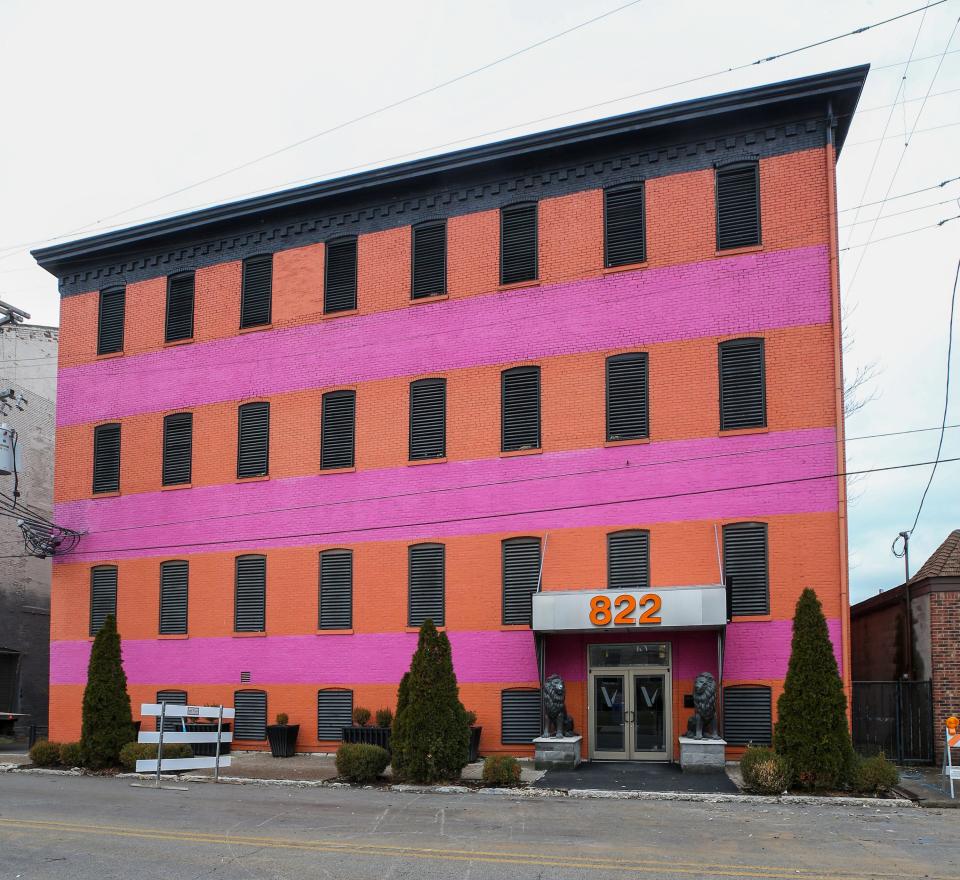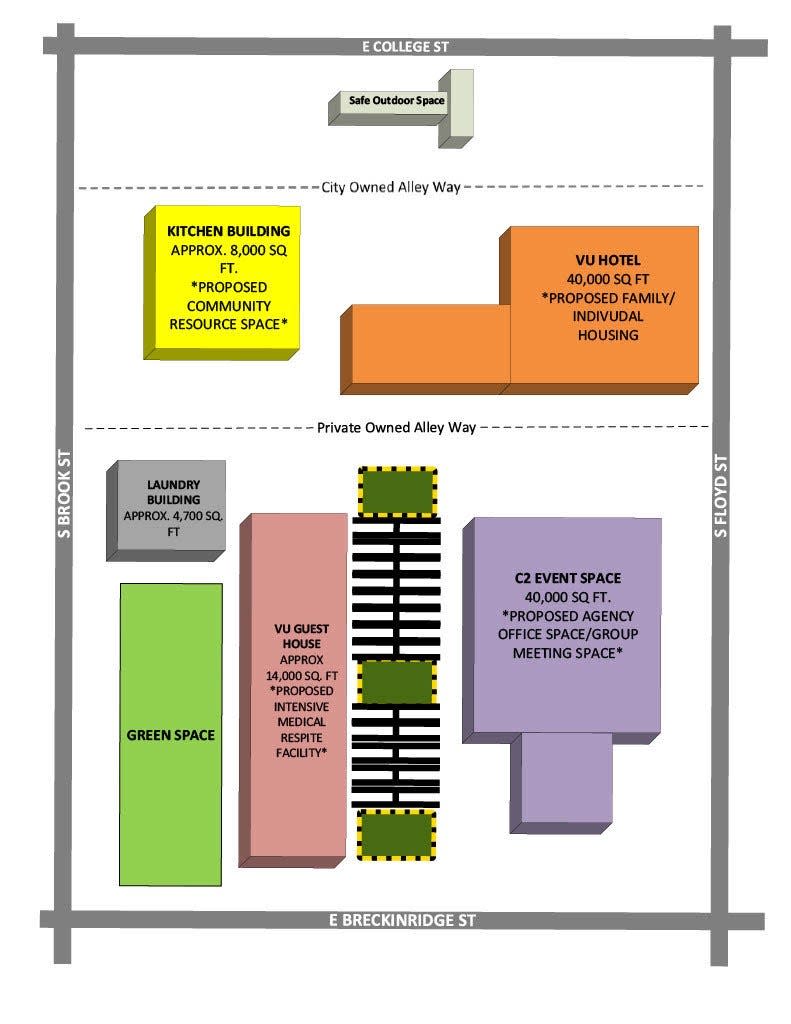Louisville to spend $30+ million on new housing campus, eviction prevention. Here's how
- Oops!Something went wrong.Please try again later.
Louisville plans to build a "first of its kind" medical and housing campus for unhoused residents, using federal funds dedicated through the American Rescue Plan, Mayor Craig Greenberg announced Thursday.
The project is part of a sweeping plan to prevent and reduce homelessness, which includes spending $8.25 million on eviction prevention services and $24 million to build more affordable housing.
The funds come from a $38 million grant the city received from Kentucky's state government last month, after the U.S. Treasury forced the state to reallocate part of its Emergency Rent Assistance Program dollars that had not been spent on deadline.
At a press conference, Greenberg said the city's plan represents an opportunity to "make meaningful, impactful, long-term differences" for people experiencing and facing homelessness.
"Today, instead of choosing between short-term and long-term solutions to this problem we are choosing to make a permanent difference and do both," the mayor, who took office earlier this month, added in a press release.
More:Louisville sweet shop destroyed in a fire is coming back and taking business on the road
How Louisville will fund eviction prevention
The first money to go out the door will be spent on emergency rent assistance for people who already applied through the Kentucky Housing Corporation, a quasi-governmental agency tasked with distributing COVID-related aid statewide.
KHC began accepting applications for Jefferson County residents in May after Louisville ran out of money for its own program. But it stopped Dec. 22 after announcing the $38 million grant.
KHC has continued to process completed applications but withdrew about 2,400 that were unfinished — leaving those residents to face possible eviction.
On Thursday, Greenberg said the city will work with the Community Area Ministries to distribute $5 million in assistance to that group.
"We have been working as fast as we can, and we know that far too many people in our community have been stressed and worried as they have applied for funding over the past several months," Greenberg said. "... On behalf of our state and local governments, I am sorry it has taken so long."
Background:Thousands of Louisville renters face eviction while city weighs aid program
Renters in need of assistance can continue to apply to a program at Louisville's Office of Resilience and Community Services, which opens new appointments on the first day of each month, a spokesperson for the mayor's office said.
The administration is not planning to invest more money in emergency rent assistance until it sees "if we get more funding from Washington," spokesperson Kevin Trager said by email.
On Thursday, the city also announced it will grant the Louisville Urban League $2.5 million to be spent on security deposits and the first month's rent for people forced to move. That program is expected to begin Feb. 20.
Another $1.25 million be spent on mediation assistance and legal representation for low-income families in eviction court.
"We know there are some really gaping holes in our system that also prevent families from having stable housing," said Kish Cumi Price, president of the Louisville Urban League. "So we're looking forward to collaborating with the mayor and his administration and the other partners in our community to help solve those issues."
What the housing campus will include
Louisville has agreed to spend $6.9 million on several properties in Old Louisville to build a "community care campus," in partnership with Norton Healthcare, U of L Health and the Coalition for the Homeless, along with other community agencies.
The campus will take up most of a block along Breckinridge Street, between Floyd and Brook streets, where the Vu Guesthouse hotel and C2, an event space, are currently located.

The city previously purchased property abutting the proposed campus to open a "safe outdoor space" for unhoused residents. Greenberg said his administration plans to continue working with operators of the site, called the Hope Village, to provide shelter for those who need it.
The new campus will provide temporary housing, medical care and connections to other services for unhoused residents. It's expected to serve 150 people per day.
"The facilities on the new community care campus will be a safe place for hospitals to discharge patients who are experiencing homelessness who require ongoing medical support," Greenberg said, including physical therapy, wound care and mental health services.
"This is an impressive, important, groundbreaking partnership that is going to change a lot of lives in our community for the better," he added.

Riggs Lewis, system vice president of health policy for Norton, said partners began working on plans for the campus a year ago. They settled on the location after touring multiple properties along the downtown Interstate 65 corridor, where 80% of Louisville's homeless community lives.
George Stinson, a member of the ownership group behind Vu and C2, said the COVID-19 pandemic slowed the businesses. And when approached to sell the properties, he saw it as an opportunity to support "the overall good of the city."
"The new administration has a brighter, more progressive outlook to make things happen," he said.
For subscribers:Can a trip to the chiropractor cause a stroke? Two Kentucky women say yes.
Stachelle Bussey, founder of the Hope Buss, which runs the Hope Village, said the medical care will be important for people in the adjacent outdoor space.
She also hopes city officials continue to engage unhoused residents and community organizations as they develop the campus.
Greenberg said the city will need at least $9 million to renovate one building on the properties.
It expects to spend about $100,000 for "minor upgrades" to the new properties, spokesperson Trager said.
More money goes toward affordable housing
The last piece of Greenberg's plan is $24 million to be spent on affordable housing — "a significant investment that will change neighborhoods and improve lives."
A 2019 Housing Needs Assessment found Louisville was in need of more than 31,000 affordable housing units.
In October, the Louisville Affordable Housing Trust Fund announced seven developments that will receive $40 million in American Rescue Plan funding to build 300 new affordable units.
The city is now seeking partners to build more units for households at or below 50% of the area's medium income, about $42,350 annually.
The deadline to apply is March 10. All projects must be completed by the end of September 2025.
Reach reporter Bailey Loosemore at bloosemore@courier-journal.com, 502-582-4646 or on Twitter @bloosemore. Support strong local journalism by subscribing today: https://www.courier-journal.com/baileyl.
This article originally appeared on Louisville Courier Journal: Louisville to put $30M+ toward affordable housing, eviction relief

